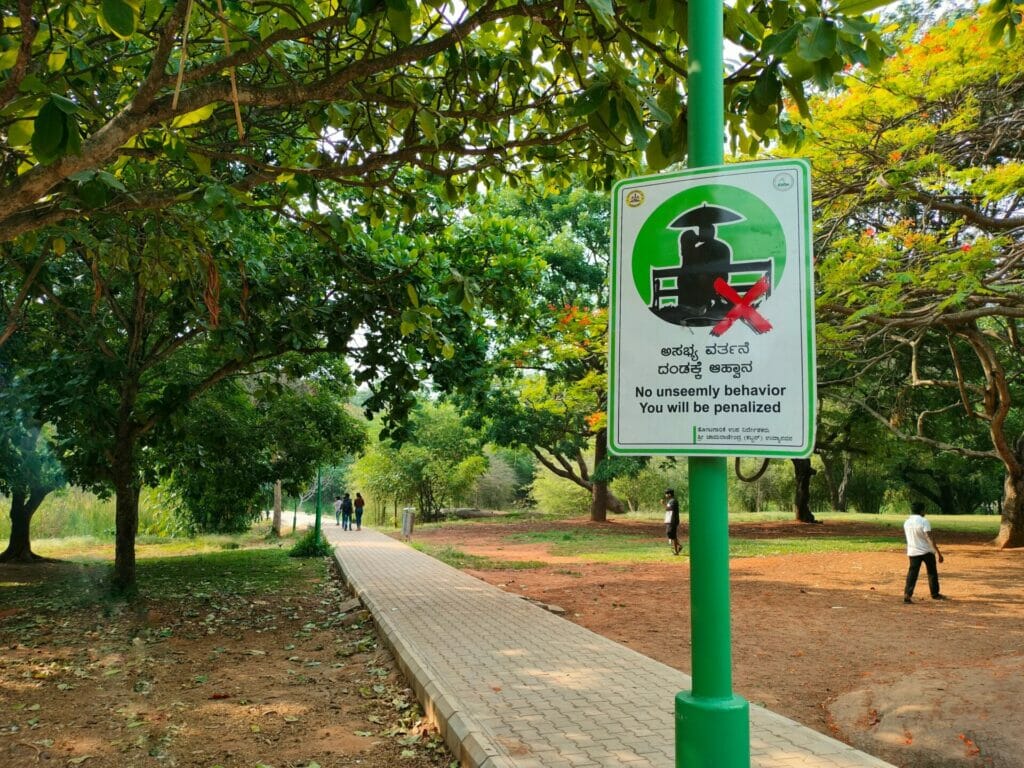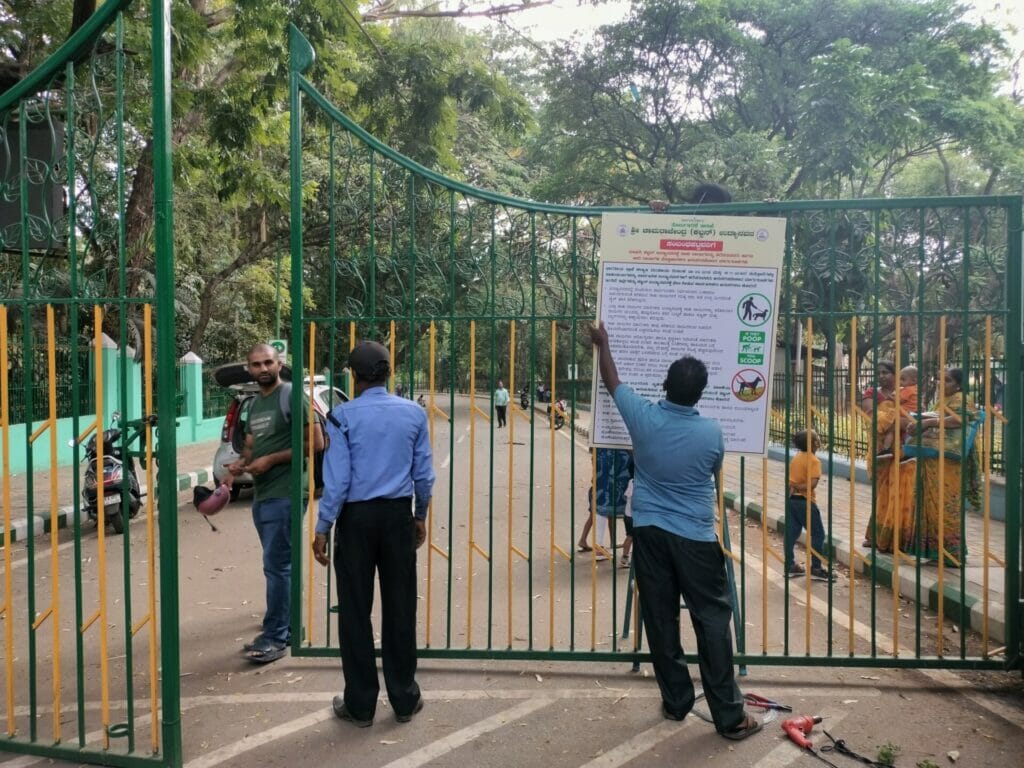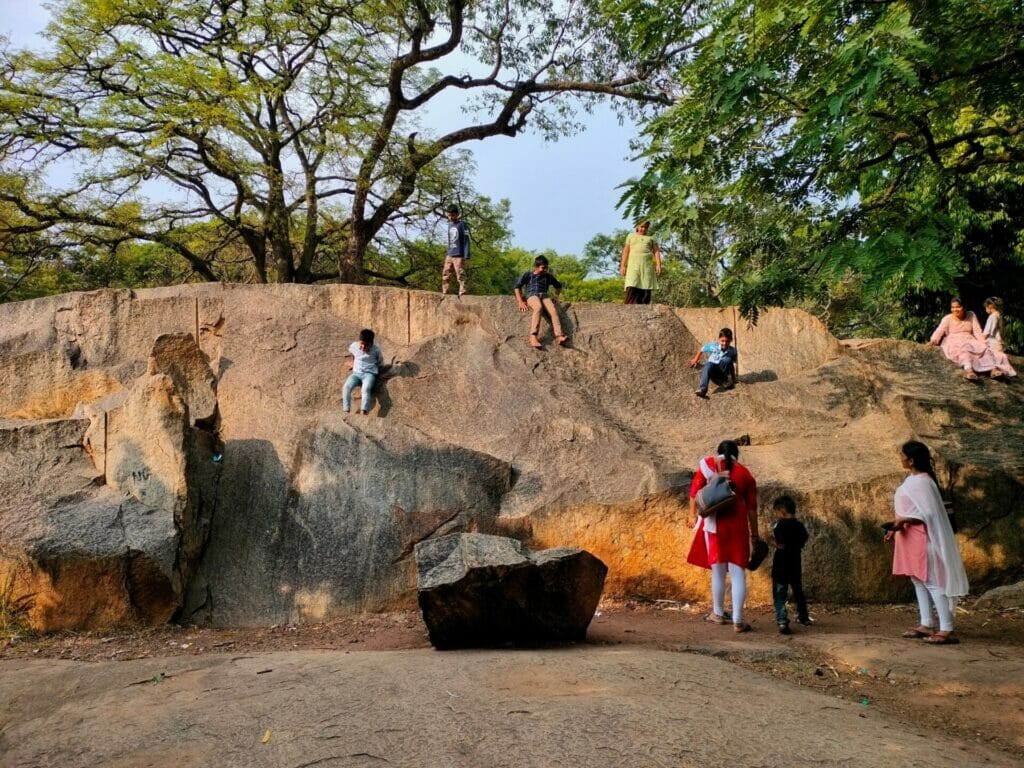The new rules for visitors in Cubbon Park, laid down by the Karnataka Horticulture Department, has been a topic of debate and discussion among citizens.
Visitors are not allowed to bring in food, not allowed to play games inside, and, the classic old issue made more stringent-no public display of affection, to the extent where couples are not allowed to sit too close to each other. While the security guards already have full power to keep couples in check for showing affection, they now in charge of ensuring the new rules are followed by all visitors.
Reasons for the new rules
“Some of these rules, like no photography and no PDA, have been around for a long time now, only a few new ones have been implemented, like no food and no games, for preserving the park and protecting the visitors,” says Bettegowda, Cubbon Park in-charge. “Despite multiple warnings, people throw food and plastic waste in the park right in front of our eyes, which is why we are not allowed to let visitors take food inside. In terms of not allowing games, people are less responsible in ensuring park properties are taken care of while playing games like cricket or badminton. This leads to the damage of properties,” he adds.
Karnataka Horticulture Department claims to have implemented these rules in Cubbon Park and Lalbagh a couple of years ago. They have now been made more stringent to preserve the greenery of Cubbon Park from further damage. “Visitors are not allowed to bring their own food inside, but they can buy food from us and go inside,” says one of the shopkeepers, who sells corn outside the gate. While the fruit juices from the Horticulture Department can be sold inside the park, tea vendors are not allowed inside.
Though the security guards are answerable to the authorities they report to, some say they have been a little lenient with the visitors with regard to the new rules. “We do not allow any food inside, but we still let people carry food from these stalls, otherwise it will hamper these small businesses,” says one of the guards. “The reason these strict laws are being imposed and we are asked to walk around with whistles and megaphones is that people are not responsible enough to respect the public space, in terms of littering, property damage, PDA, ecology protection, and a few other basic ethics,” another guard pipes in.

Varied opinions of visitors
Most visitors do not agree with the new regulations in Cubbon Park. “Parks are meant for leisure. We come to these spaces for some time out from the hustle and bustle of the city. Now, with guards on their loudspeakers and restricting every bit of what you do and where you go inside the park makes leisure time tiresome,” says Deeksha, a regular visitor. “This is moral policing to tell people what is morally right and wrong by a few in power. This reduces the public space to yet another government office of sorts, and not really a place you can come to breathe in some fresh air,” complains Jayanth, a college student.
However, a few regular visitors are in favour of the new rules. “Though people come to parks for some relaxation, there has to be some sort of regulations to protect the environment as well. Considering how poor people are with basic responsibilities, it only makes sense that these stringent rules come into effect. It is not difficult to not damage park property, not litter, or not make people feel uncomfortable with physical intimacy. If people find this difficult to comprehend and abide by, it’s only natural these rules will become more stringent,” says Padmaja, a regular walker in Cubbon.

Bengaluru and its parks
Bengaluru has more than 1,200 parks and around 190 playgrounds, which already accounts for a small portion of area in comparison to the city’s total space. This further complicates the problem of accessibility, with most parks being closed during the middle of the day. “We have changed the timings, and most parks in the city are now open from 5 am to 10 am and are later reopened at 1:30 pm till 8 pm. We are obligated to close the gates for a few hours in the late mornings till early afternoons as we have to use that limited time to clean the premises, water the plants and trees, and maintain the park for the public’s benefit, though the closing hours tend to cause a bit of inconvenience,” says Chandrashekar, Deputy Director of Horticulture under Bruhat Bengaluru Mahanagara Palike (BBMP).
Park management
While approximately more than 1,000 parks in the city fall under the jurisdiction of the BBMP Horticulture Department, the two largest parks in the city, Lalbagh Botanical Garden and Cubbon Park, are managed by the Karnataka Horticulture Department.
Cubbon Park is not the first park to implement these rigid rules. “Plastic has been completely banned in Lalbagh for a few years now. These rules were first implemented here before it got extended to Cubbon Park. Though we let people take some snacks in containers and their personal water bottles, we insist they keep the premises clean inside the park,” says Sunita, security in-charge at Lalbagh.
How restrictions hamper citizen activities
With less than 200 playgrounds in the city, children now hardly have space for outdoor games due to park regulations. Taking DSLR cameras inside has been banned in many parks in the city, including Cubbon and Lalbagh, citing environmental reasons and based on complaints from visitors. In Jayaprakash Narayan Park, the guards check the bags of every visitor for food and cameras before letting them inside. “It has become a hassle crossing through the park each day, as I have to explain why I am carrying my tiffin box every time at the gate,” says Rachana, a college student, who walks through the park to get home.
The guards at Sankey Tank stop visitors from bringing food items at the gate, even the ones from the stalls outside. “People go and eat inside and litter the place every time, so it’s better to keep the whole eating business outside,” affirms the guard. Most parks in the city have these few basic regulations, which are implemented in varying levels of strictness.
“We charge visitors with a minimal ticket price only here at Lalbagh, as this is not a park, but a botanical garden,” says an officer at Karnataka Horticulture Department, on condition of anonymity. “We have sufficient resources to run both the public spaces under our jurisdiction and so far, we have received public support in managing these spaces in terms of any regulations we’ve imposed so far,” they say, although there are some contrasting opinions from the public.
Read more: The cost of high LPG prices: Environmental and health hazards in slums
The government grants Rs 80 crore annually to the BBMP Horticulture Department to manage the parks under their jurisdiction, they claim there is no lack of resources or funding for managing the parks.
However, as per a 2022 TOI report, Rs 6.5 crore was sanctioned to develop and maintain 37 parks in Jayanagar and surrounding neighbourhoods. However, BBMP spent 85% of the funds on developing only six parks. Some never-ending park renovations with heavy funding, include JP Park (Rs 37 crore), which has been underway for more than seven months with extravagant lighting and setting up of a toy train and Sankey Tank, with Rs 30 crore, which has been under refurbishment for over a year now.
According to the Karnataka Parks, Play-fields and Open Spaces (Preservation and Regulation) Act of 1985, ‘whoever throws any rubbish into any park, play-field or open space specified in the list published under section 4 or section 5 shall be punishable with imprisonment for a term which may extend to six months or with fine or with both.’
As per a parks and playgrounds survey report by ichangemycity in 2017, 54% of the parks in the city contain garbage/ debris. The implementation of the Act is under question as not only do people continue to litter without bothering, but also despite there being a solution, it is not being implemented, though the departments claim to have imposed fines ranging from Rs 500 to 1,000 in most parks.

Citizens equally responsible to making parks better public spaces
The once ‘Garden City’ is now not only struggling to re-establish sufficient greenery amidst burgeoning urbanisation, but is also juggling to preserve the existing ecology, unfortunately at the cost of the public commons. While these stringent rules are mandatory to keep the ecology alive, the same rules are snatching away people’s diminishing leisure spaces.
With Bengaluru already struggling with crippling lack of adequate open spaces for the public, and around a quarter of parks being closed most of the time, the preservation and renovation of parks is vital for the city. But this is not just the responsibility of lawmakers alone. If visitors have issues with stringent regulations in parks, then they must also adhere to basic ethics that have to be followed in public spaces. If the power of authorities are kept in check and the public follows basic civic responsibilities, then our parks will be protected and citizens will also enjoy their leisure time.